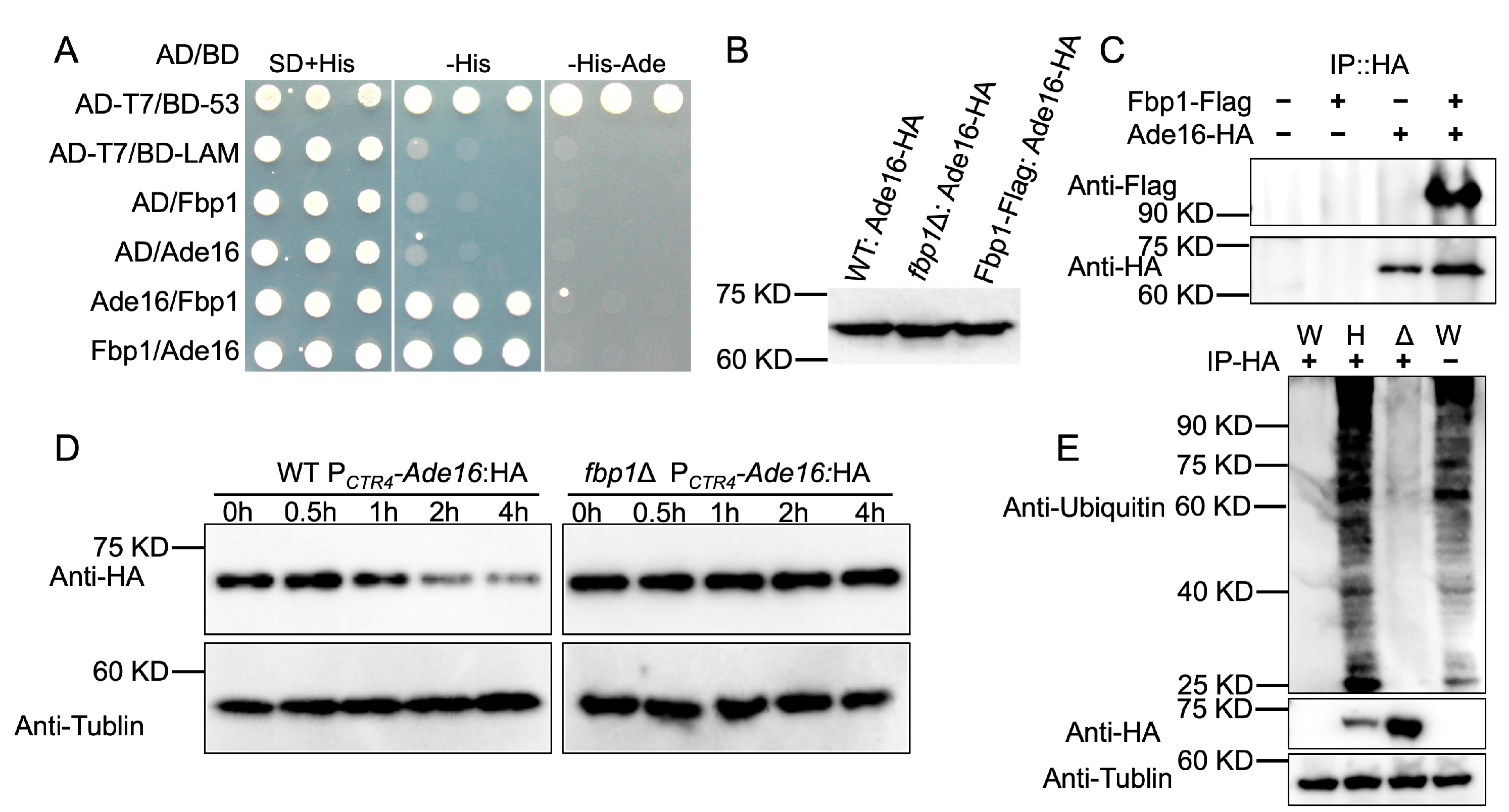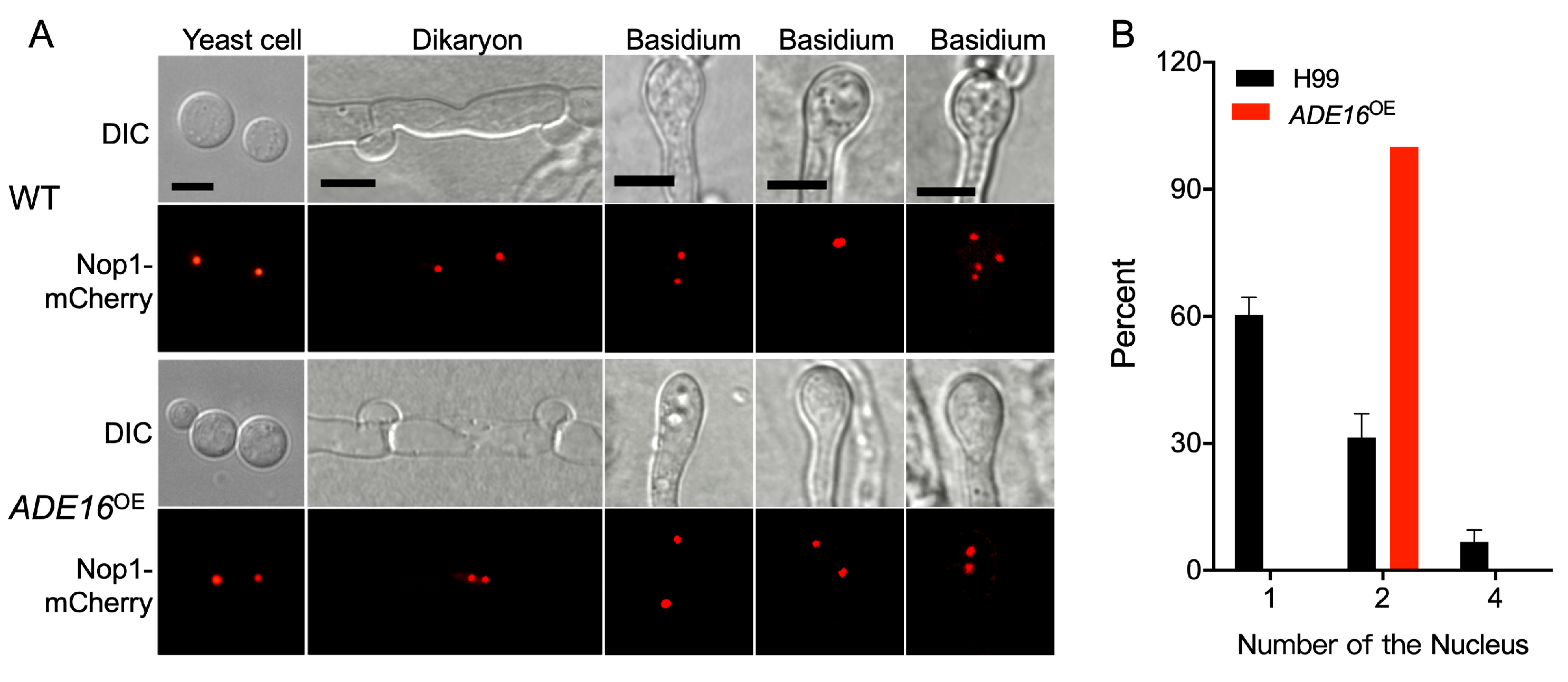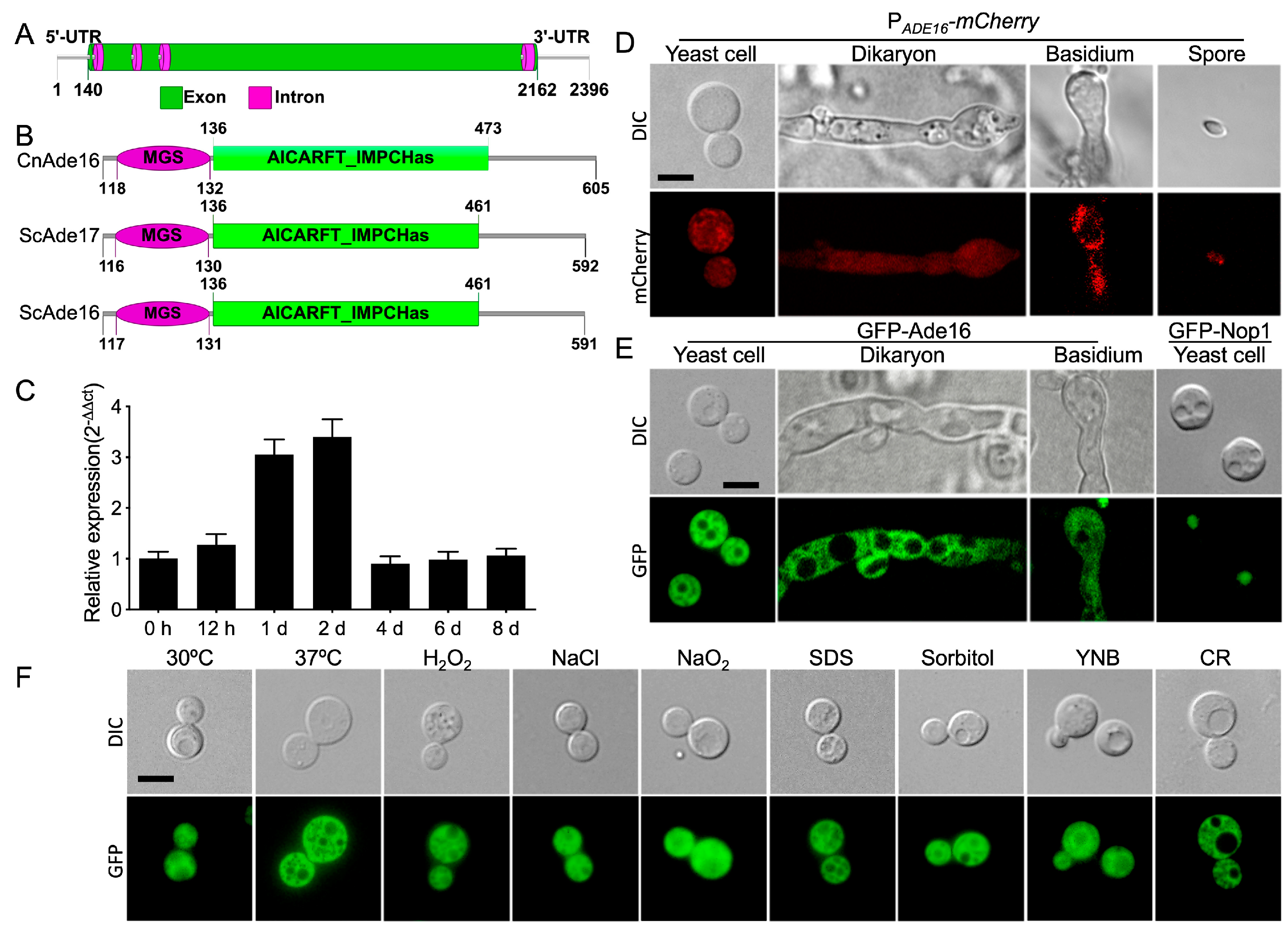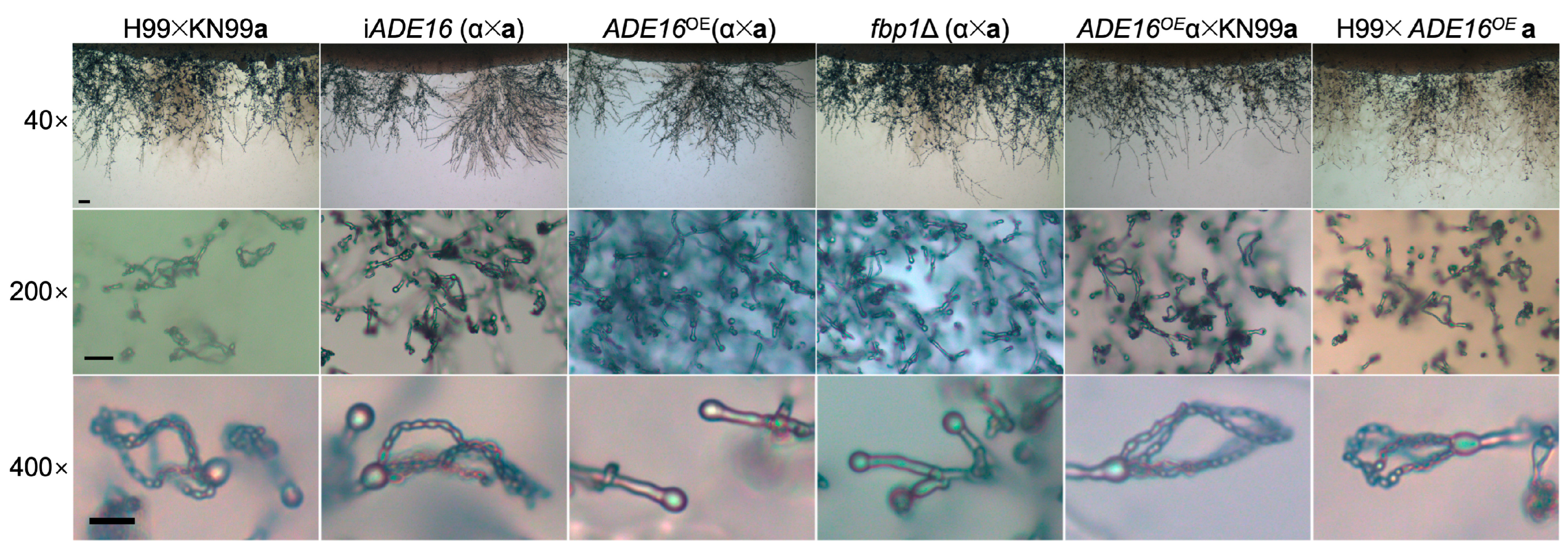1. Introduction
Cryptococcus neoformans is a yeast-like pathogenic fungus that is widely found in natural environments such as soil, plant surface, and bird feces [
1]. The basidiospores or dried yeast cells of
C. neoformans can be inhaled into the host’s lungs through the respiratory tract and can be eliminated or in a state of latent infection in the immunocompetent hosts [
2]. When the host’s immunity is impaired, or the hosts are immunocompromised individuals,
C. neoformans can proliferate in the lungs of the host and cause cryptococcal pneumonia, penetrating the blood-brain barrier (BBB) to cause deadly cryptococcal meningitis [
3]. Statistically,15% of the deaths related to acquired immune deficiency syndrome (AIDS) are caused by cryptococcal meningitis, and about 220,000 cases of cryptococcal meningitis are caused yearly [
4].
As a basidiomycete,
C. neoformans has two mating types, ⍺ and
a, which can reproduce sexually or asexually [
5]. Typically,
C. neoformans grows in the form of budding yeast and can switch from yeast growth to filamentous growth by mating and monokaryotic fruiting [
6,
7]. The transition of morphotypes from yeast to hyphae marks the beginning of the sexual development of
C. neoformans [
8]. During the mating of
C. neoformans, the yeast cells of different matting types fused and formed dikaryotic mating hyphae, and eventually, a basidium, the specialized sporulation structure, was produced at the tip of the hyphae. Then after completing meiosis inside the basidium, four chains of basidiospores were generated at the top of the basidium [
7,
8]. Similar environmental factors also affect the monokaryotic fruiting of
C. neoformans but happen between the haploid yeast cells of the same mating type, such as ⍺ cells [
9,
10]. Compared with mating, the hyphal cells produced by monokaryotic fruiting are mononucleate diploid cells with unfused clamp connections [
9].
The sexual reproduction of
C. neoformans was regulated by many environmental factors and genetic circuits. Environmental factors such as light, darkness, ambient temperature, nutrition deficiency, pheromone, and metal ions can regulate cell-cell fusion and mating hypha growth during the sexual reproduction of
C. neoformans [
6,
10], and the mechanisms of these environmental factors affecting the sexual cycle are usually rooted in gene regulatory circuits. The genetic circuits, such as the Cpk1 MAPK pathway and the pheromone response pathway, also regulate the sexual reproduction of
C. neoformans, as mutation of components in these pathways blocks the sexual reproduction of
C. neoformans [
6,
11,
12,
13,
14]. Besides these pheromone response pathways, other factors, such as zinc finger proteins, have also been identified as common regulators for sexual reproduction in
C. neoformans [
13,
15,
16]. Our previous studies showed that SCF E3 ligases play a vital role in the sexual reproduction of
C. neoformans, as disruption of the key proteins of SCF E3 ligases such as Fbp1 and Cdc4 block the basidiospore production in
C. neoformans [
17,
18]. However, the molecular mechanism by which the F-box protein regulates
C. neoformans sexual reproduction remains unclear. Here, we identified an AICAR transformylase/IMP cyclohydrolase Ade16 and proved that Ade16 is a downstream target of Fbp1. Overexpression of the
ADE16 gene blocks the basidiospores formation by affecting the nuclei fusion of the meiosis process during mating. Our findings uncovered a new determinant of fungal development involving the post-translational regulation of an AICAR transformylase/IMP cyclohydrolase.
2. Materials and Methods
2.1. Strains and Growth Conditions
The wild-type strains of
C. neoformans, H99 and KN99
a, and their derived strains were preserved routinely in our laboratory and cultured on a YPD agar or liquid medium at 30°C.
C. neoformans strains expressing the genes controlled by the
CTR4 promoter were cultured on a YPD medium supplemented with 200 μM bathoproproinediulonic acid (BCS) or 25 μM CuSO4 with 1 mM ascorbic acid [
19]. The yeast strain used in the yeast two-hybrid assay was Y187, whose transformants were cultured on a synthetic defined medium without leucine, tryptophan, histidine, or adenine. The
C. neoformans and yeast strains used in the study are shown in
Table S1. All other media used in the study were prepared as described previously [
17].
2.2. Quantitative Real-Time PCR
To detect the
ADE16 gene expression under different conditions, the quantitative real-time PCR (qRT-PCR) was used to measure the expression
ADE16 gene at mRNA levels as previously described [
20]. Briefly, the yeast cells or mating mixtures of each cryptococcal strain were collected and cleaned with distilled water (dH
2O), and total RNA was extracted and purified using an Omega total RNA kit (Omega Bio-tek, USA). The purified RNAs was quantified using a Nanodrop spectrometer (DeNovix, USA), and the first-strand cDNA synthesis was synthesized with a Hifair® II 1st Strand cDNA Synthesis Kit (Yeasen, Shanghai, China), as described by the manufacturer. The analysis of the
ADE16 gene expression was performed using FastStart Essential DNA Green Master (Roche), and the gene expression level was normalized using the endogenous control gene
GAPDH. The relative gene expression levels were measured using the previously described comparative threshold cycle (CT) method [
21]. The qRT-PCRs were carried out using a LightCycler®96 QPCR system (Roche) as described previously [
22].
2.3. Generation of Fluorescence Strains
To detect the
ADE16 gene expression in
C. neoformans at different developmental stages, we amplified a 1996-bp
ADE16 gene promoter sequence using the genomic DNA of H99 as a template with primers TL1166/1167 (see Table 2 for primer sequences) and inserted it into the pTBL5 [
16] plasmid to construct the plasmid pTBL196. Then the pTBL196 plasmid was linearized by
SalI, concentrated, and biolistically introduced into the wild-type strains, H99 and KN99
a, respectively, as previously described [
23]. Stable transformants were further screened by growing on YPD plates with nourseothricin sulfate (100 mg/L) and fluorescence examination under an Olympus inverted confocal microscope (Olympus, FV1200). Finally, two mating types of the P
ADE16-mCherry fluorescence fusion expression strains (α and
a) were obtained and named TBL310 and TBL378, respectively.
To determine the Ade16 sub-cellular localization, we amplified the ADE16 gene coding sequence from the H99 genomic DNA using primers TL1164/TL1165 and inserted it into the pCN19 vector to construct the GFP and ADE16 fusion gene expression vector pTBL186. The XbaI-linearized pTBL186 was biolisticallly introduced into the H99 or KN99a strains, respectively. Stable transformants were further confirmed on YPD plates with nourseothricin sulfate (100 mg/L) and named TBL308 and TBL309, respectively. The fluorescence of the transformants was examined by confocal microscopy (Olympus, FV1200).
2.4. Yeast Two-Hybrid Assays
We first carried out a yeast two-hybrid interaction assay to detect the interaction between Ade16 and Fbp1 proteins as described previously [
17,
24]. The full-length cDNAs of
ADE16 and
FBP1 genes were amplified with primers TL879/880 and 588/589 and cloned into the bait vector pGBKT7 to fuse with the BD domain (pTBL106 and pTBL100), respectively. Meanwhile, the cDNAs of
ADE16 and
FBP1 were also amplified with primers TL883/884 and TL572/573 and inserted into the pGADT7 prey vector (pTBL145 and pTBL142), respectively, fusing with the AD domain. The inserted cDNAs were verified by sequencing to ensure the proteins were translated correctly. Both prey and bait constructs were co-transformed into the yeast strain Y187. After transformation, the yeast cells were transferred to an SD-Leu-Trp plate and incubated for 2-3 days at 30°C. The transformants growing on SD-Leu-Trp-His or SD-Leu-Trp-His-Ade plates were considered positive interactions. The transformants carrying pGADT7-T7/pGBKT7-LAM and pGADT7-T7/pGBKT7-53 served as negative and positive controls, respectively (Clontech, Dalian, China).
2.5. Generation of Tagged Protein Strains
To obtain
C. neoformans strains expressing the Ade16-HA protein, we first amplified the
ADE16 cDNA with primers TL893/894. We then cloned it into the
BamHI sites of the vector pCTR4-2 [
19] to generate the Ade16:HA fusion plasmid pTBL149 using the In-Fusion HD cloning kit (Clontech, Dalian, China). The
C. neoformans strain (TBL81) expressing the Fbp1-Flag fusion proteins was generated by our previous studies [
25]. To detect the interaction between Ade16 and Fbp1 in
C. neoformans, we biolistically introduced the
EcoRI-linearized pTBL149 into TBL81, the Fbp1-Flag strain, and the wild-type H99, respectively, generating the
C. neoformans strains TBL248 and TBL264, which express Fbp1:Flag/Ade16:HA proteins and Ade16:HA proteins, respectively.
Total proteins were extracted and examined by Western blotting with anti-HA or anti-Flag antibodies to ensure the correct tagged strains were obtained. Protein pull-down was performed using SureBeads™ anti-HA or anti-Flag Magnetic Beads (Bio-RAD) as described previously [
20] to collect the tagged proteins, and immunoblotting was used to detect the Ade16-HA or Fbp1-Flag proteins with anti-HA or anti-Flag antibodies, respectively.
To detect the Ade16 stability in H99 and fbp1Δ mutant strains backgrounds, we introduced the EcoRI-linearized pTBL149 into the fbp1Δ mutant ballistically to construct the Ade16:HA strains TBL264 and TBL265. Then the yeast cells of TBL264 and TBL265 strains were grown in liquid YPD to mid-logarithmic phase, transferred to YPD containing 25 μM CuSO4 and 1 mM ascorbic acid, and incubated for an additional 1, 2, 4, and 6 h. Yeast cells were harvested, and protein extracts were prepared as described above. The signals of Ade16:HA was detected by Western blotting using a monoclonal anti-HA antibody (Sigma).
2.6. Ubiquitination assay of Ade16 in vivo
Besides the stability assay of the Ade16 in the backgrounds of the wild-type H99 and fbp1Δ mutant, we also investigated the ubiquitination of Ade16 in the above strain backgrounds. Strains H99, H99::PCTR4-ADE16:HA(TBL264), and fbp1Δ::PCTR4-ADE16:HA (TBL265) were inoculated into 50 mL YPD broth and grown overnight at 180 rpm at 30 °C. The yeast cells of the above three strains were harvested, washed, and lyophilized, and 1 ml of non-denaturing lysate and 1 microliter of deubiquitinase inhibitor b-AP15 were added for protein extraction. Then the supernatant of the yeast lysates was purified by EZviewTM Red ANTI-HA M2 Affinity Gel (Sigma). Meanwhile, the same amount of the H99 cells were added with 1 ml of Breakage Buffer for protein extraction. The protein samples obtained above were separated by SDS-PAGE gel and detected by Western blotting using Ubiquitin and HA antibodies, respectively.
2.7. Generation of ADE16 Interferences and Overexpression Strains
To generate the ADE16 promoter replacement strain, we use a split marker strategy to replace the ADE16 promoter with a copper-repressible CTR4 promoter. In the first round of PCR, as shown in Figure 3A, the 5’ fragment, the NEO marker, and the PCTR4-ADE16 fusion fragment were amplified with primers TL1036/TL1037, TL17/TL18, and TL1034/TL1038 using the H99 genomic DNA, pJAF1, and pTBL149 as templates, respectively. In the next round of PCR, the fusion fragment of the 5’ fragment and NEO marker was amplified with primers TL1036/TL20 using the mixture of the 5’ fragment and NEO marker as templates. Similarly, using the mixture of the NEO marker and PCTR4-ADE16 fragment as templates, the fusion fragment of the NEO marker and the PCTR4-ADE16 fragment was amplified with primers TL19/TL1038. The above two fusion fragments were mixed, concentrated, and biolistically introduced into the H99 strain to construct the PCTR4-ADE16 strains TBL270. The TBL270 strain was further confirmed by PCR with primers TL373/TL59 and Southern blotting. To verify whether ADE16 is an essential gene for C. neoformans, we dropped the H99 and TBL270 strain onto YPD, YPD+200 μM BCS, and YPD+25 μM CuSO4+1 mM ascorbic acid plate, respectively, after series dilution. The growth of each cryptococcal strain was observed after 2-3 days of incubation at 30 °C.
To generate the ADE16 interferences strains, we first constructed a plasmid PiADE16 for RNA interference of the ADE16 gene in three steps. Step I, a 200-bp intron of the ADE16 gene, was amplified using primers TL1334/1335 and inserted into the BamHI/PacI sites of pTBL5 to generate the plasmid pTBL226. Step II, a 480-bp ADE16 5’-3 fragment, the ADE16 RNA interference sequence, was amplified using primers TL1336/1337 and inserted into the BamHI site of pTBL226 to generate pTBL227. Step III, a reversed 480-bp ADE16 RNA interference sequence was amplified using primers TL1467/1468 and inserted into the PacI/SpeI sites of pTBL227 to generate pTBL237. After verification by sequencing, the SalI-linearized pTBL237 was biolistically introduced into the wild-type strains (H99 and KN99a). After PCR verification with primers TL1336/1340, the expression level of the ADE16 gene was quantitated by quantitative real-time PCR in each transformant, and two mating types of ADE16 interference strains were named TBL414 and TBL415, respectively.
To obtain the ADE16 gene overexpression strain in C. neoformans, we first amplified the ADE16 gene using primers TL1092/1093 and inserted it into the BamHI site of the pTBL153 plasmid to generate pTBL174. Then the ApaI-linearized pTBL175 was biolistically introduced into the wild-type H99 and KN99a strains. Stable transformants were further confirmed on a YPD medium containing 100 mg/L nourseothricin sulfate. The ADE16 gene overexpression (TBL288 and TBL302) was verified by qRT-PCR. To monitor the nuclei positioning in the ADE16 overexpression strains during mating, pTBL59, a NOP1-mCherry-NEO cassette, was biolistically transformed into the ADE16 overexpression strain of both ⍺ and a mating types to generate TBL445 and TBL446.
2.8. Analysis of Melanin and Capsule
To examine the role of Ade16 in C. neoformans melanin production, we grew the wild-type H99 strain and the Ade16-related strains in a YPD liquid medium overnight at 30 °C. One hundred microliters of each culture was dropped on the Niger seed medium to evaluate the melanin production by incubating the agar plates for 2-3 days at 30°C or 37°C. The pigmentation of each cryptococcal strain was evaluated and photographed.
To assess the role of Ade16 in
C. neoformans capsule production, overnight cultures of each cryptococcal strain were washed with 1×PBS buffer three times and incubated overnight in diluted Sabouraud medium (DSM) or MM with mannitol at 37°C [
26,
27]. The quantification of the capsule size was performed as previously described [
17].
2.9. Mating assay
To investigate the role of Ade16 in C. neoformans mating, equal amounts of the ⍺ and a mating type yeast cells were mixed and grown on MS or V8 agar plates in the dark at 25 °C. After 14 days of incubation, the formation of mating hyphae and basidiospores was visualized and recorded using an Olympus CX41 light microscope.
4. Discussion
The F-box proteins are the critical component of the SCF E3 ligases and play a vital role in fungal virulence and development. Our previous studies have shown that the F-box protein Fbp1 is required for the sexual reproduction of the human fungal pathogen
C. neoformans, as the basidiospore formation is blocked in bilateral mating of the
fbp1Δ mutants [
17]. However, the mechanism by which Fbp1 regulates the sexual reproduction of
C. neoformans remains unclear. To identify the potential downstream targets of Fbp1, we carried out an iTRAQ analysis coupled with LC-MS/MS in a previous study to investigate the enriched target proteins in
fbp1Δ mutants [
20]. In this study, we identified the AICAR transformylase/IMP cyclohydrolase Ade16 and demonstrated that Ade16 interacts directly with Fbp1, and the degradation and ubiquitination of Ade16 depend on the function of Fbp1. The gene expression analysis revealed that the
ADE16 gene was expressed at all developmental stages, and the Ade16 protein was localized in the cytoplasm of
C. neoformans cells. RNA interference of the
ADE16 gene led to a significant decrease in capsule size, while overexpression led to a significant increase in capsule size in
C. neoformans. Overexpression of
ADE16 resulted in the production of normal mating hyphae but a failure of basidiospore formation, which is consistent with the phenotype of the
fbp1Δ mutants (
Figure 6), suggesting Fbp1 may regulate the sexual reproduction by regulating the Ade16. Our findings suggest that the SCF(Fbp1) E3 ligase-mediated UPS pathway regulates
C. neoformans sexual reproduction by regulating the ATIC Ade16.
5-aminoimidazole-4-carboxamide ribonucleotide formyltransferase/IMP cyclohydrolase (AICARFT/IMPCHase, ATIC) is a bienzyme catalyzing the last two steps of the purine
de novo biosynthesis pathway [
30]. In
S. cerevisiae, the ATIC isozyme is encoded by two genes,
ADE16 on chromosome XII and
ADE17 on chromosome XIII, respectively [
31]. The amino acid sequences of the two genes are 84% identical to each other, which is 60%-63% identical to the chicken and human bifunctional AICAR transformylase/IMP cyclohydrolase [
31]. Sequence blast analysis revealed that the
C. neoformans CNAG_00700 has 69% and 65% sequence identities with the Ade17p and Ade16p in
S. cerevisiae, respectively (
Figure 1B and
Table 2). However, the CNAG_00700 has been identified and named
ADE16 by Wizrah et al.; therefore, we will follow their name and name CNAG_00700
ADE16.
We first analyzed the
ADE16 gene expression and found that the
ADE16 was expressed at all development stages of
C. neoformans, and the Ade16 protein was localized in the cytoplasm of
C. neoformans cells, consisting with the Ade17p localization in
S. cerevisiae [
32]. Since Ade16 was highly enriched in the
fbp1Δ mutants and could be a downstream target of Fbp1, we then performed the protein interaction, stability, and ubiquitination assays and found that Ade16 interacts with Fbp1 and its stability and ubiquitination is dependent on the function of Fbp1. These findings suggest that the SCF(Fbp1) E3 ligase-mediated UPS pathway might regulate the purine
de novo biosynthesis pathway in
C. neoformans by regulating the ATIC Ade16. So far, to our knowledge, there have been no reports on the regulation of Ade16 protein degradation, so our findings may reveal a new regulatory pathway for Ade16 protein degradation.
Given the importance of the Ade16 protein in the purine
de novo biosynthesis, we attempted to knock out the
ADE16 gene in
C. neoformans. However, we tried several rounds of transformation, screened hundreds of transformants, and still failed to get the
ADE16 gene knockout mutants. Later, we adopted the strategy of replacing the native promoter of the
ADE16 gene with a copper-repressible
CTR4 promoter, examined the growth of the transformants on the medium containing CuSO
4, and found that the P
CTR4-ADE16 strains showed great growth defect (
Figure 2B). However, in
S. cerevisiae, the null mutants of
ADE17 or the paralog
ADE16 are viable [
31]. Disruption of both
S. cerevisiae ADE17 and
ADE16 led to adenine auxotrophy, while the expression of either gene alone was sufficient to support growth without adenine [
31], indicating that the two genes were redundant in function. Why do we try to knock out the
ADE16 gene in
C. neoformans but fail to get the
ADE16 knockout transformants? Could only one
ADE16 be present in
C. neoformans, unlike
S. cerevisiae, which has an Ade16 paralog, Ade17? To answer this question, we used the
C. neoformans Ade16 sequence as a query and did a BLASTp search against the genome database of
C. neoformans in FungiDB [
28]. The results showed that the protein with the highest identity to Ade16 was CNAG_07373, a large subunit of the Carbamoyl-phosphate synthase with a sequence identity of 25% with Ade16, indicating that there is no paralog of Ade16 in
C. neoformans genome. Thus, disruption of the
ADE16 gene resulted in adenine auxotrophy in
C. neoformans, and the
ade16Δ mutants could not grow on the YPD medium without additional adenine and histidine, which led to the mistaken belief that the
ADE16 gene was essential and could not be knocked out. This is confirmed by the growth of
ade16Δ mutants obtained by Wizrah et al. [
29] on YPD, consistent with our strain P
CTR4-ADE16 strains on YPD containing CuSO
4.
The polysaccharide capsule is a virulence factor that plays a key role in the interaction between
C. neoformans cells and the immune system, protecting
C. neoformans cells from being phagocytosis by immune cells [
33].In this study, we found that the
ADE16 interference would decrease the capsule size of
C. neoformans, while the
ADE17 gene overexpression would lead to the enlargement of the capsule, indicating that the formation of
C. neoformans capsule is related to the expression level of
ADE17. In the Wizrah et al. study, the
ade16Δ strain also displayed reduced capsule size at 30 °C and 37 °C [
29]. The results from both groups suggested that Ade16 plays an important role in the capsule formation of
C. neoformans.
Sexual reproduction allows genetic material from two parents to recombine, resulting in recombinant offspring with the potential for variable adaptation, and allows natural selection to more effectively remove harmful mutations that accumulate in the parental genomes [
34]. In
C. neoformans, sexual reproduction links to virulence, antifungal drug resistance, and rapid adaptive evolution [
35,
36]. Many environmental factors and genetic circuits regulate sexual reproduction in
C. neoformans [
10]. Our previous study showed that the SCF(Fbp1) E3 ligase-mediated UPS regulates sexual reproduction in
C. neoformans [
17]. However, the molecular mechanism by which Fbp1 regulates sexual reproduction in
C. neoformans remains unclear. In this study, we identified the AICAR transformylase/IMP cyclohydrolase (ATIC) Ade16 as a substrate of Fbp1 and demonstrated that Ade16 is involved in the sexual reproduction of
C. neoformans. As a bienzyme catalyzing the last two steps of the purine
de novo biosynthesis pathway, Ade16 is involved in the sexual reproductive process of
C. neoformans, which is truly amazing. Until now, why and how Ade16 is involved in the sexual reproductive process of
C. neoformans is unknown. There are few studies on Ade16 in fungi, mainly in
S. cerevisiae [
31,
32,
37,
38]. In
C. neoformans, the Ade16 was identified by Wizrah et al. and proved to be essential for
de novo purine biosynthesis [
29]. The
ADE16 gene was only mentioned in research on a new high-throughput screening procedure for the detection of sporulation defects in 624 non-lethal homozygous deletion mutants created by the European Joint research project EUROFAN [
39]. So far, the mechanism of Ade16's involvement in the regulation of fungal sexual reproduction remains unclear, which is, of course, what we will tackle in the future of this study.
In conclusion, our study discovered a novel substrate of Fbp1 in C. neoformans and unveiled a novel sexual reproduction regulatory pathway involving the SCF(Fbp1) E3 ligase-mediated UPS and its regulation of the AICAR transformylase/IMP cyclohydrolase in C. neoformans. Given the importance of the AICAR transformylase/IMP cyclohydrolase, it would be interesting to investigate how the AICAR transformylase/IMP cyclohydrolase regulates sexual reproduction in C. neoformans.
Figure 1.
Identification of C. neoformans Ade16. Schematic illustration of the ADE16 gene (A) and the Ade16 protein (B) in C. neoformans. MGS: methylglyoxal synthase domain; AICARFT_IMPCHas: AICARFT/IMPCHase bienzyme domain. (C) The ADE16 expression during bilateral mating on the V8 medium was qualified by qRT-PCR. The error bars represent the standard deviations of three independent repeats. Expression of mCherry (D) under the control of ADE16 promoter and subcellular localization of the GFP-Ade16 fusion protein (E) in Cryptoccus different development stages. Representative fluorescence and bright-field images of the yeast cells, dikaryons, basidia, and basidiospores are shown. The nuclear localization of GFP-Nop1 was used as a positive control. Bar, 5 µm. (F) Subcellular localization of the GFP-Ade16 fusion protein in yeast cells of C. neoformans under different stressors. DIC, differential interference contrast; Bar, 5 µm.
Figure 1.
Identification of C. neoformans Ade16. Schematic illustration of the ADE16 gene (A) and the Ade16 protein (B) in C. neoformans. MGS: methylglyoxal synthase domain; AICARFT_IMPCHas: AICARFT/IMPCHase bienzyme domain. (C) The ADE16 expression during bilateral mating on the V8 medium was qualified by qRT-PCR. The error bars represent the standard deviations of three independent repeats. Expression of mCherry (D) under the control of ADE16 promoter and subcellular localization of the GFP-Ade16 fusion protein (E) in Cryptoccus different development stages. Representative fluorescence and bright-field images of the yeast cells, dikaryons, basidia, and basidiospores are shown. The nuclear localization of GFP-Nop1 was used as a positive control. Bar, 5 µm. (F) Subcellular localization of the GFP-Ade16 fusion protein in yeast cells of C. neoformans under different stressors. DIC, differential interference contrast; Bar, 5 µm.
Figure 3.
Generation of the ADE16 interference strains and overexpression strains in C. neoformans. (A) The strategy of the ADE16 native promoter substitution. 5’, ~1kb DNA fragment upstream of ADE16 gene promoter; PADE16, ADE16 native promoter; ADE16 ORF, ADE16 open reading frame; NEO, NEO marker gene; PCTR4, the copper-ion-suppressing CTR4 promoter. (B) The growth of the PCTR4-ADE16 strains on YPD with 200 μM BCS and YPD with 25 μM CuSO4 and 1 mM ascorbic acid. Yeast cells grown overnight of the PCTR4-ADE16 strains were diluted to an OD600 value of 2.0, followed by ten-fold dilutions. 5-µL of each diluent was plated on YPD agar plates with different stressors and incubated at 30°C for 2 days. The C. neoformans strains are indicated on the left, and the incubation conditions are on the top. (C) PCR verification of the iADE16 interference strains (TBL414 and TBL415) with primers TL1336/1340. (D) Determination of the interference efficiency of the ADE16 gene by qRT-PCR. The ADE16 gene expression levels in the H99 strain grown on YPD were set as 1, and the GAPDH gene expression was used as an internal control. The data shown are the mean ± standard deviation from three repeats. ****, P < 0.0001. (E) The expression of the Ade16-HA fusion protein in ADE16OE overexpression strains (TBL288 and TBL302) was confirmed by Western blotting. (F) Overexpression of ADE16-HA TBL288 and TBL302 was also measured by relative qRT-PCR analysis. ****, P < 0.0001.
Figure 3.
Generation of the ADE16 interference strains and overexpression strains in C. neoformans. (A) The strategy of the ADE16 native promoter substitution. 5’, ~1kb DNA fragment upstream of ADE16 gene promoter; PADE16, ADE16 native promoter; ADE16 ORF, ADE16 open reading frame; NEO, NEO marker gene; PCTR4, the copper-ion-suppressing CTR4 promoter. (B) The growth of the PCTR4-ADE16 strains on YPD with 200 μM BCS and YPD with 25 μM CuSO4 and 1 mM ascorbic acid. Yeast cells grown overnight of the PCTR4-ADE16 strains were diluted to an OD600 value of 2.0, followed by ten-fold dilutions. 5-µL of each diluent was plated on YPD agar plates with different stressors and incubated at 30°C for 2 days. The C. neoformans strains are indicated on the left, and the incubation conditions are on the top. (C) PCR verification of the iADE16 interference strains (TBL414 and TBL415) with primers TL1336/1340. (D) Determination of the interference efficiency of the ADE16 gene by qRT-PCR. The ADE16 gene expression levels in the H99 strain grown on YPD were set as 1, and the GAPDH gene expression was used as an internal control. The data shown are the mean ± standard deviation from three repeats. ****, P < 0.0001. (E) The expression of the Ade16-HA fusion protein in ADE16OE overexpression strains (TBL288 and TBL302) was confirmed by Western blotting. (F) Overexpression of ADE16-HA TBL288 and TBL302 was also measured by relative qRT-PCR analysis. ****, P < 0.0001.
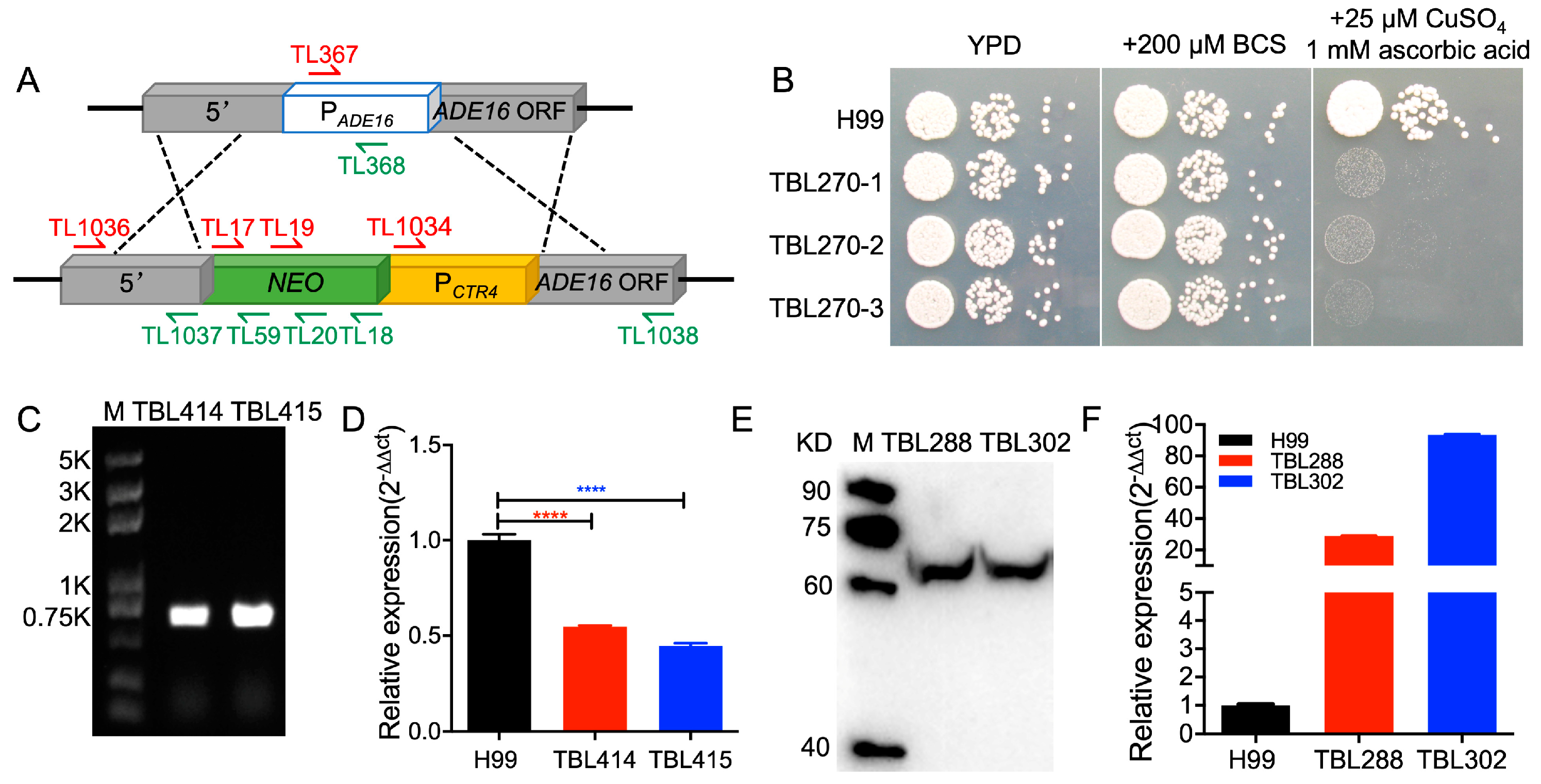
Figure 4.
Ade16 is involved in the formation of Cryptococcus capsules. (A) Capsule formation and melanin production of Ade16-related strains. Melanin production by the C. neoformans strains was induced on Niger seed plates and photographed after incubation at 37°C for two days. Capsule formation was examined in a diluted SAB medium. Each C. neoformans strain was grown in a diluted SAB medium for 24 hours at 37°C, and the capsule formation was examined by India ink staining. Bars=5 μm. (B) Statistical analysis of the capsule formation in each C. neoformans strain in diluted SAB medium. The capsule sizes of more than 100 yeast cells were measured, and the data shown were the mean and standard deviation of the three replicates. ns: not significant; ****, P < 0.0001. (C) The growth of the C. neoformans strains under different stress conditions. Yeast cells grown overnight were diluted to an OD600 value of 2.0, followed by ten-fold dilutions. 5-µL of each diluent was plated on YPD agar plates with different stressors and incubated at 30°C for 2 days. The C. neoformans strains are indicated on the left, and the incubation conditions are on the top.
Figure 4.
Ade16 is involved in the formation of Cryptococcus capsules. (A) Capsule formation and melanin production of Ade16-related strains. Melanin production by the C. neoformans strains was induced on Niger seed plates and photographed after incubation at 37°C for two days. Capsule formation was examined in a diluted SAB medium. Each C. neoformans strain was grown in a diluted SAB medium for 24 hours at 37°C, and the capsule formation was examined by India ink staining. Bars=5 μm. (B) Statistical analysis of the capsule formation in each C. neoformans strain in diluted SAB medium. The capsule sizes of more than 100 yeast cells were measured, and the data shown were the mean and standard deviation of the three replicates. ns: not significant; ****, P < 0.0001. (C) The growth of the C. neoformans strains under different stress conditions. Yeast cells grown overnight were diluted to an OD600 value of 2.0, followed by ten-fold dilutions. 5-µL of each diluent was plated on YPD agar plates with different stressors and incubated at 30°C for 2 days. The C. neoformans strains are indicated on the left, and the incubation conditions are on the top.
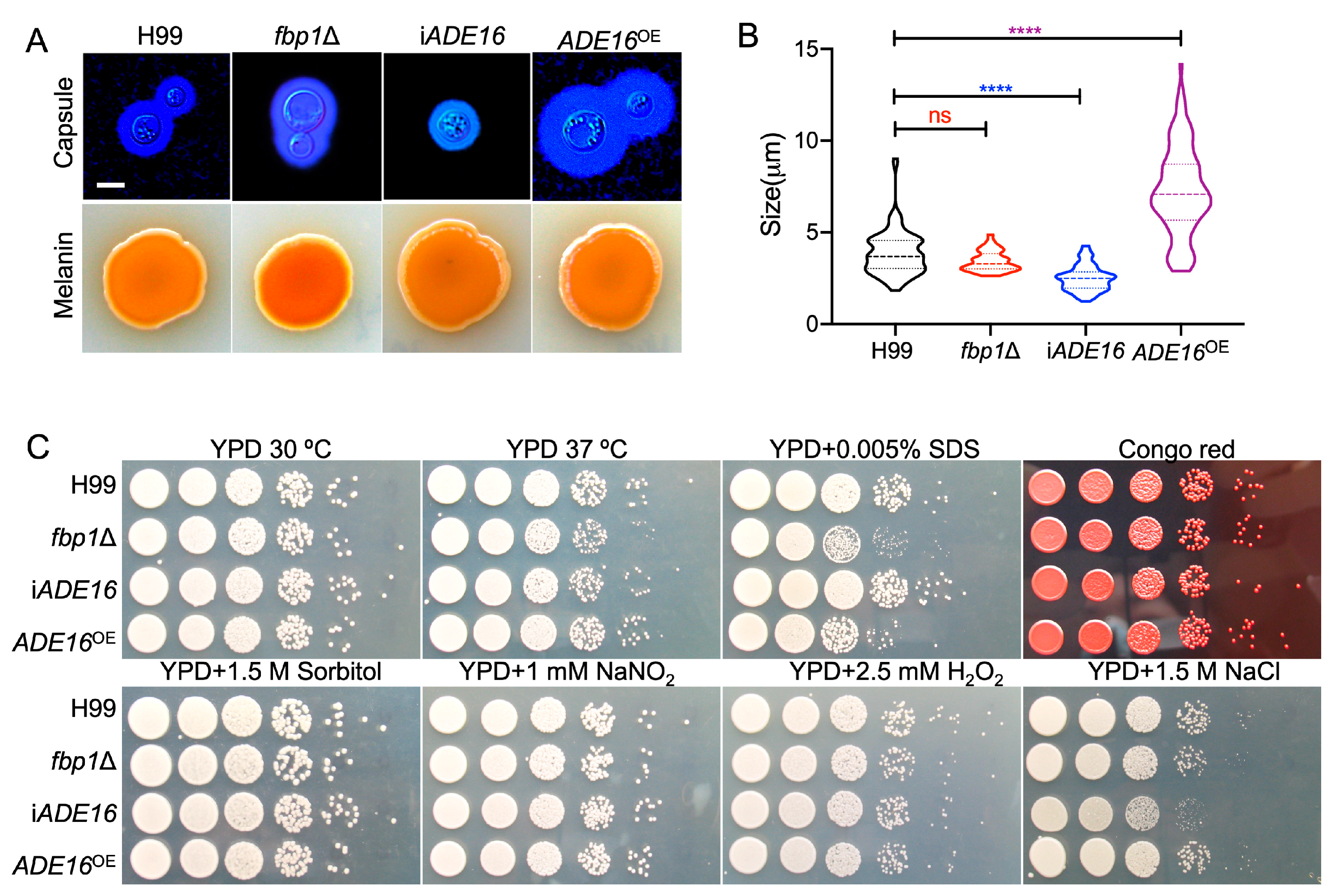
Figure 5.
Ade16 is involved in the sexual reproduction of C. neoformans. The wild types, iADE16 interference strains, and ADE16OE strains were crossed on MS medium for bilateral or unilateral mating assays. Mating hyphae and basidiospores at ×40 magnification (top panel, bar = 100 μm), ×200 magnification (middle panel, bar = 50 μm), and ×400 magnification (bottom panel, bar = 10 μm) were imaged after 2 weeks of incubation at 25°C in the dark.
Figure 5.
Ade16 is involved in the sexual reproduction of C. neoformans. The wild types, iADE16 interference strains, and ADE16OE strains were crossed on MS medium for bilateral or unilateral mating assays. Mating hyphae and basidiospores at ×40 magnification (top panel, bar = 100 μm), ×200 magnification (middle panel, bar = 50 μm), and ×400 magnification (bottom panel, bar = 10 μm) were imaged after 2 weeks of incubation at 25°C in the dark.
Table 1.
The partial enriched proteins identified in the fbp1Δ mutant of C. neoformans.
Table 1.
The partial enriched proteins identified in the fbp1Δ mutant of C. neoformans.
| Accession |
Description |
Average fbp1Δ/H99 |
No. of PEST Domain |
| CNAG_05514 |
Uncharacterized protein |
1.899038 |
0 |
| CNAG_01974 |
Ribosomal protein |
1.631707 |
2 |
| CNAG_06195 |
Uncharacterized protein |
1.595274 |
0 |
| CNAG_00700 |
ATIC Ade16 |
1.544354 |
0 |
| CNAG_05498 |
Uncharacterized protein |
1.541769 |
1 |
| CNAG_02860 |
Endo-1,3(4)-beta-glucanase |
1.522101 |
2 |
| CNAG_01019 |
Superoxide dismutase |
1.470508 |
0 |
| CNAG_02344 |
Uracil phosphoribosyltransferase |
1.431079 |
1 |
| CNAG_02738 |
Uncharacterized protein |
1.400934 |
0 |
| CNAG_01109 |
Uncharacterized protein |
1.384226 |
1 |
Table 2.
Homologs of C. neoformans Ade16 in other species.
Table 2.
Homologs of C. neoformans Ade16 in other species.
| Organism |
Protein |
Query cover |
Expect |
Identities |
Positives |
|
Saccharomyces cerevisiae
|
ATIC Ade17
|
91% |
0 |
69% |
78% |
|
Saccharomyces cerevisiae
|
ATIC Ade16
|
92% |
0 |
65% |
77% |
|
Schizosaccharomyces pombe
|
ATIC
|
91% |
0 |
69% |
78% |
|
Ustilago maydis
|
ATIC Ade17
|
100%
|
0
|
67%
|
78%
|
| Candida albicans |
ATIC Ade17
|
98% |
0 |
67% |
78% |
| Candida auris |
bifunctional purine biosynthesis protein Ade17 |
98% |
0 |
67% |
78% |
|
Mus musculus
|
bifunctional purine biosynthesis protein ATIC
|
92% |
0 |
62% |
75% |
| Homo sapiens |
bifunctional purine biosynthesis protein ATIC
|
91% |
0 |
62% |
75% |
